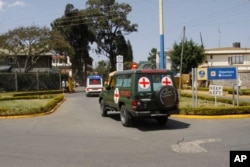Al-Shabab extremists from neighboring Somalia beheaded nine civilians in an attack on a village in Kenya's southeast early Saturday, officials said, adding to growing concerns the Islamic militant group has taken up a bloody new strategy.
The attack occurred in Jima village in Lamu County, said James Ole Serian, who leads a task force of security agencies combating the al-Qaida-linked al-Shabab.
Beheadings by al-Shabab have been rare in Kenya, even as the group has carried out dozens of deadly attacks over the years. Beheadings are not uncommon in Somalia, where the extremists carry them out on people who are believed to be enemies and to terrorize local populations.
This East Africa country has seen an increase in attacks claimed by al-Shabab in recent weeks, posing a security threat ahead of next month's presidential election.
Al-Shabab has vowed retribution on Kenya for sending troops in 2011 to Somalia to fight the group, which last year became the deadliest Islamic extremist group in Africa.
Saturday's attack occurred in the Pandaguo area, where al-Shabab fighters engaged security agencies in a daylong battle three days earlier. A police report said about 15 al-Shabab fighters attacked Jima village and seized men, killing them with knives.
Al-Shabab in recent months has increased attacks in Kenya with homemade bombs, killing at least 46 people in Lamu and Mandera counties.
The increase in attacks presents a huge problem for Kenya's security agencies ahead of the August 8 presidential election, said Andrew Franklin, a former U.S. Marine who is a security analyst. On election day, security agencies will be strained while attempting to stop any possible violence, and al-Shabab could take advantage, he said.
There was no immediate government comment on the latest attack.
Acting Interior Minister Fred Matiangi issued a dusk-to-dawn curfew for parts of Garissa, Tana River and Lamu counties. Mandera County already was under a curfew following earlier al-Shabab attacks. All are close to the Somali border.
President Uhuru Kenyatta has not issued any statement on the recent surge in al-Shabab attacks.
Kenya is among five countries contributing troops to an African Union force that is bolstering Somalia's fragile central government against al-Shabab's insurgency. Of the troop-contributing countries, Kenya has borne the brunt of retaliatory attacks from al-Shabab.





